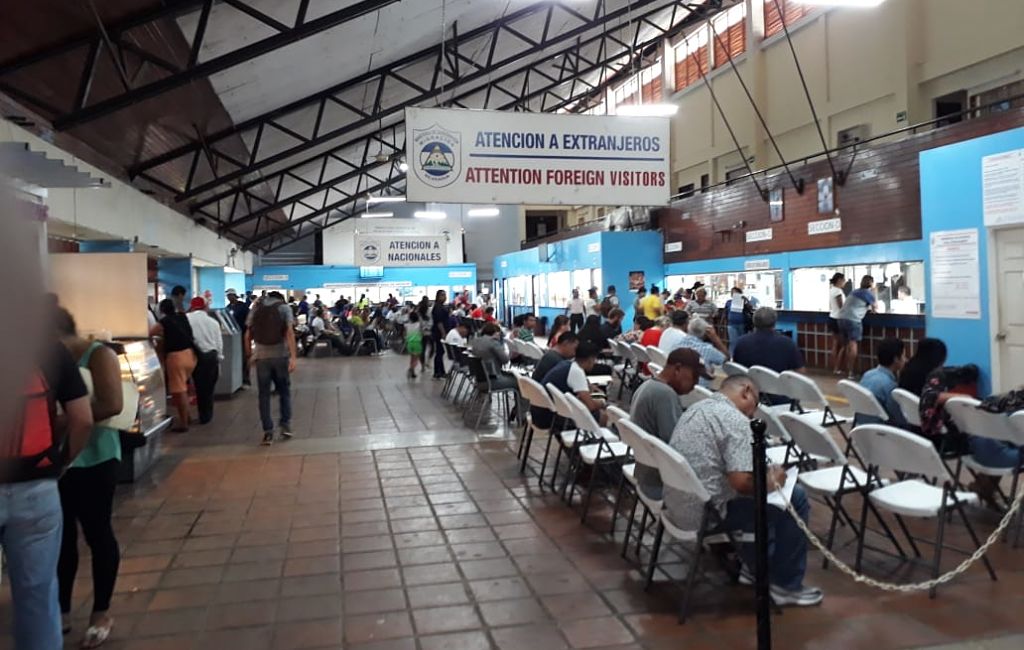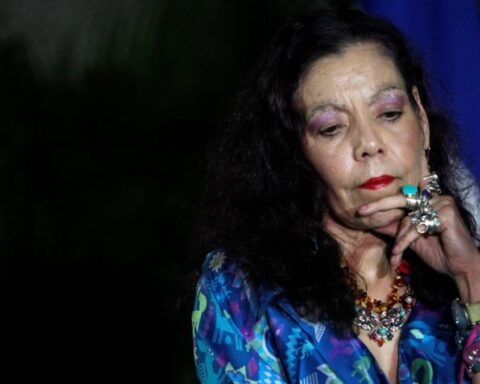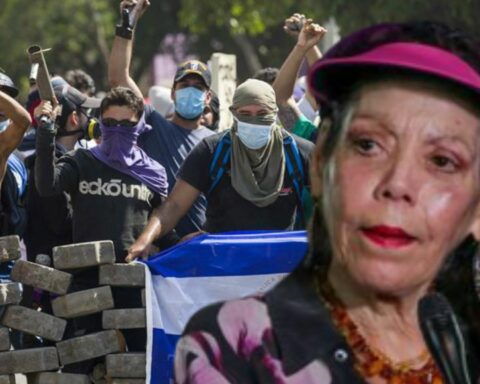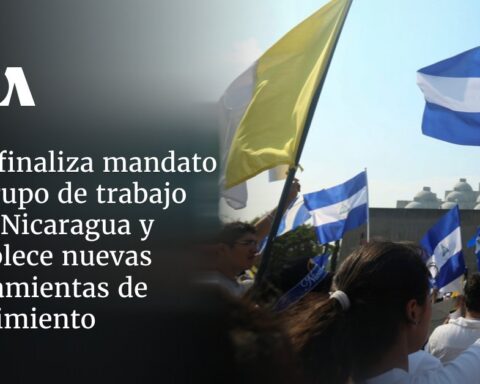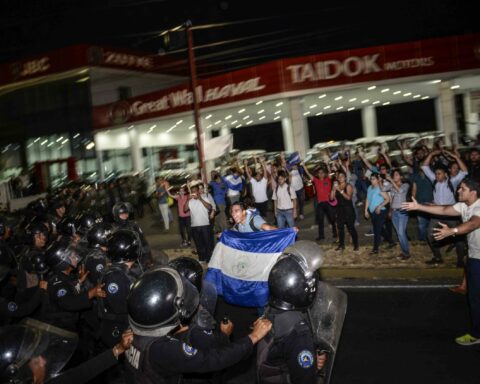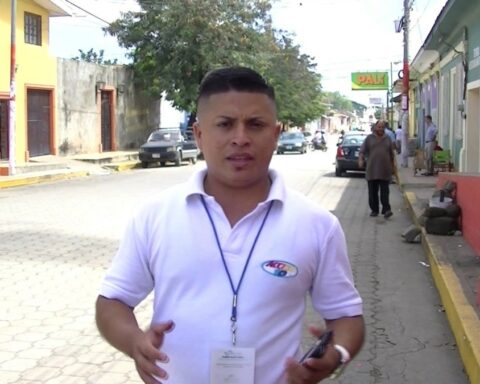The regime of Daniel Ortega and Murillo has been generous with certain migratory profiles. Fugitives from justice, Russian scientists or related diplomats are among the 81 foreign nationalized Nicaraguans between January 2021 and May 2022, according to an analysis of CONFIDENTIAL of the resolutions of the General Directorate of Migration and Aliens (DGME).
The lack of transparency characterized the granting of 35 of the 81 nationalizations, where the precise data of the total number of years of permanence in the country of the applicants was hidden, a key requirement for obtaining nationality according to Law 716 of Migration and Immigration. , published in the Gazette in 2011.
Another finding is that 18 cases correspond to representatives with some link to the dictatorship, such as former Salvadoran President Salvador Sánchez Cerén and at least eight relatives, who were made Nicaraguan between July 29 and August 11, 2021.
Both the former Salvadoran president and his wife Rosa Margarita Villalta were “international guests” at the inauguration of the Sandinista ruler last January, after a re-election considered illegitimate by the international community due to the elimination of competition and the lack of democratic guarantees.
The resolutions favorable to Ortega’s allies contrast with the arbitrary decisions —including the exile of nationals— made by Nicaraguan Immigration and which have punished opponents and citizens in general, in the midst of an adverse context against civil liberties, established as a State policy to eliminate any type of dissidence.
Nicaraguan legislation establishes a minimum of two years of residence in the country to obtain nationality, in the case of Central Americans or natives of Spain. It is four years for citizens of other nations.
“It is a basic premise: the resolutions must be motivated by the facts. The Constitution establishes that any resolution must be substantiated, because if not, it will have no value,” said Nicaraguan jurist Gonzalo Carrión, coordinator of the Human Rights group Nunca + in Costa Rica.
The activist questioned that in some cases only the data is written in the resolutions that the beneficiary with the nationality has permanent residence, without specifying when he came to the country and when he obtained it, which would shed more light on the fulfillment or not of the requirements. established.
According to the official documents, signed by Commander Juan Emilio Rivas Benítez, director of the DGME, his main arguments for granting nationality were: the request made by the interested party, compliance with the formal requirements and finally that it is a “sovereign decision”. of the Nicaraguan State.
In January 2021, the immigration authorities tightened the controls established for other foreigners, denying them multi-year residency in order to subject them to a “domicile control” every month or 15 days.
For lawyer Alexandra Salazar, the DGME cannot claim that the information on nationalization cases is confidential, since the Migration Law itself establishes in article 218 that it applies when it is in process, but not when it was approved and published in La Gaceta.
Neither in the Law of Access to Public Information are there limitations for this type of information to be transparent, according to Salazar, which does not happen – and it is understandable – with data that can, for example, put national security at risk.
“Beyond nationality, I would think of the transparency with which they act in the DGME, which extends to other reported actions. Nowhere in our legislation is it established that the entry of nationals into the territory is prevented, ”says Salazar.
fugitives from justice
Sánchez Cerén is the second former Salvadoran president, persecuted by the justice of his country, who finds refuge in Nicaragua due to the political will of Ortega. In the same swearing-in of the Sandinista last January, for a fourth term, his predecessor Mauricio Funes also participated, an active defender of the Nicaraguan dictatorship who was granted nationality in 2019.
For Carrión, it is not credible that Sánchez Cerén has complied with the requirement of two years of residence in Nicaragua, taking into account that he handed over the presidential sash to the current president Nayib Bukele on June 1, 2019, which means that he had to move to Nicaragua. almost immediately to comply with the provisions of Law 716.
“Between the last moment I was in El Salvador and being the beneficiary of Nicaraguan nationalization, it was not proven that the two years had elapsed (in the case of Central Americans). Residence is not acquired by touching the territory, there is a procedure. They skipped it,” said Carrión.
Another fugitive, also persecuted by the justice of his country of origin, is the Guatemalan Gustavo Adolfo Herrera Castillo, who was naturalized on October 2, 2021, and like Sánchez Cerén, the time of residence in national territory is not mentioned in the resolution either. . The sovereignty of Nicaragua is argued to grant the benefit.
Carrión insisted that these types of decisions are “tiny, insufficient and unmotivated” to highlight what should be acts strictly attached to the country’s legal framework. In the past, the Nicaraguan dictatorship has benefited other characters with a questionable track record, such as two former FARC guerrillas who were granted political asylum in 2008 or former deputy Luis Rabbé, a refugee in Nicaragua in 2016.
Mechnikov’s “prize winners” with nationalizations
Others nationalized were Russian scientists who allegedly work at the Mechnikov manufacturing plant in Managua.
Anatoly Eduardovich Evtushenko, naturalized on June 2, 2021, is perhaps the most prominent case of that group. In a meeting during October 2016, between Ortega and the director of the World Health Organization, he was cited as “deputy director of the Development of the Institute of Vaccines and Serums of Saint Petersburg.”
In the electronic sheet of the laboratory, both he and Elena Kazakova, another nationalized by Ortega, continue to be officials of that institution.
Kazakova, who is “Nicaraguan” since July 27, 2021, is the director of Human Resources at the same Institute. In a press release from the official media, she was even presented as such, three months after giving her nationality.
The general manager of the Mechnikov vaccine plant, Stalisnav Valentinovich Uiba, is another beneficiary. Immigration granted him nationality on July 9.
Uiba told the official Channel 4, on behalf of the local laboratory, that they were in communication with “our Russian partner and exactionist in all matters” referring to the Institute in Saint Petersburg and that they were actively searching for a vaccine against the coronavirus. They never complied and his speech only served the regime’s propaganda.
Diplomats related to Ortega, such as former Taiwanese ambassador Jaime Chin-Mu Wu and his wife, were also converted into “Nicaraguans” by the dictatorship, although they did meet the requirements to remain in the country with a history of 14 years in national territory.
The decision could not have been more controversial, because the regime made it after breaking diplomatic relations with that nation to reestablish them with Popular China, which caused Taiwan to question Chin-Mu.
Migration decisions are under the control of the Executive, not only because it is a dependency of the Ministry of the Interior. According to the jurist and member of the board of directors of the Civic Alliance, María Asunción Moreno, the DGME does not have autonomy and its decisions –even minimal ones– depend on the presidential family.
Other nationalized who did meet requirements
CONFIDENTIAL found in the official documentation that there are other requests for nationalizations, in which the legal formalities are complied with, but it is also evident that some beneficiaries have links with the ruling party.
In March 2021, the DGME nationalized, after meeting the requirements, Ana María Sivori, originally from Argentina, widow of Enrique Gorriarán Merlo, head of the operation to eliminate Anastasio Somoza Debayle in Paraguay on September 17, 1980.
There is also the case of Sozan Adli Moza Saed, daughter of the nationalized in 1990, Ahmud Musa Farhood, a businessman linked to Hamas according to media reports that cite US authorities.
Another case is that of the Cuban Argimiro Ojeda Vives, who identifies himself as a technical adviser to the Nicaraguan Institute of Civil Aeronautics (INAC). He was naturalized on February 25, 2022, after proving six years of residence in Nicaragua, in accordance with resolution 3303.
The data indicates that the majority of beneficiaries are Cubans (fifteen), followed by Salvadorans with fourteen—probably inflated by the Sánchez Cerén case—and the Russians occupy third place with nine.
Venezuela has seven nationalized, Spain and the United States six each; Honduras, Guatemala and Palestine with two each; Taiwan, Brazil, Colombia and Northern Ireland with three each; Argentina, Jordan, Peru, People’s China, Denmark and Costa Rica with one individually.
The way to obtain Nicaraguan nationality
According to the Nicaraguan Migration Law, the ways to obtain nationality are the following:
to) Article 52: It is granted by the National Assembly based on the extraordinary merits of foreigners who have provided a service to Nicaragua.
b) Article 53: for all those who prove to be residents for four years, after renouncing the nationality of origin
c) Article 54: Those of Central American or Spanish origin who are required to reside for a minimum of two years without the need to renounce their nationality of origin.
d) Article 55: referred to foreign investors, who have established an industry in Nicaragua or “who carry out an activity that contributes to the economic, social, scientific and cultural,” but they are also required to prove at least two years of residence in the country.
e) Article 56: Those who have residency for two years with Nicaraguan children may acquire it.
f) Article 57: Extended to children of nationalized citizens for those under 21 years of age, who are under the guardianship of the nationalized citizen, which will be ratified when they reach the age of majority.

